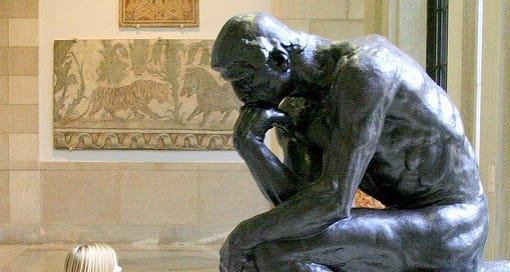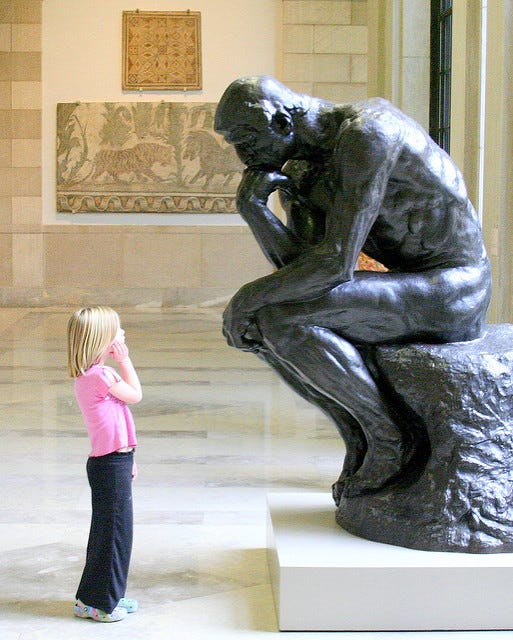It’s just time to start writing more. This is a model that I have learned from Tyler Cowen, and most writers I admire write every day whether or not they have time for it. David Perell has tweeted that writing and thinking are the same thing. Thus, if you are a thinker, writing is not a waste of time. Writing is the thing you are doing anyway in your muddled head.
(Source: Joy Buchanan, Starting to blog today – Economist Writing Every Day1)
In your muddled head, you’re writing anyway. If you’re a thinker, you’re writing anyway, and it’s not a waste of time. Writing and thinking are the same thing.
I relate to this.
There’s a decision, however, whether writing ought to go public, whether you should post it online somewhere. The single shift The Daily Inchoate makes in my life is that now my thinking-writing is going (quasi-) public.
— Whether something posted actually becomes public technically depends on whether or not there is anyone there is read it. The tree that falls in the forest… :)
Thankfully, a few friends and family have discovered my new Substack and gamely subscribed. I appreciate all of you wondering what I’m up to.
After six weeks of more or less daily writing, today I’m reflecting that YES, the daily writing has been a good practice to establish, including going “public.” But now I’m thinking about the next step. How to improve?
I really admire successfully wide-ranging academics (post-academics), journalists, and professional literary writers. They abound here on Substack! I had no idea. I keep finding people I never knew were on Substack — on Substack. The quality of content, the quality of constructive conversation, is unique. I want to be part of it.
Confession, and Dilemma
But here’s a confession, and a dilemma. I want to be
(of Noahpinion). (That’s the confession.) I envy his workflow that allows him — somehow! — to produce high quality, researched posts nearly every day! Clearly, he’s a trained economist with a lot of experience in his field, but he has also mastered a process of wide reading, researching, reporting, and writing. He has a system, and he is able to keep it up day in and day out, year in and year out. (I can’t imagine the life sacrifices it takes to do that.)But now for the dilemma. I’m not an expert. I suppose I could be, or could have been, in one or another of the fields I’ve studied over the years, but I’m not. Every time I got close to being a sort-of expert, I pulled away to some other next realm of enticing ideas. The temptation became irresistible once I hit the real intellectual limits of any given subject area. They exist. All fields have limits. You have to agree to be bound by them if you want to stay and become an expert. Being intellectual bound doesn’t suit me.
Besides, if I have an intellectual gift (and I’ve been told this many times by objective third parties, so I’m not making it up), it is that I’m better at synthesis than analysis. I’m better at cross-relating ideas from way over there to way over here in ways most people can’t or — sensibly — won’t. That’s my gift, which is also a curse, because not every connection between far flung thoughts is going to make any sense whatsoever two days later.
Mile Wide, Inch Deep — and some alternatives
I used to have a good friend who loved to contrast the “mile wide and inch deep” with what she thought had genuine depth, layers upon layers, all the way down to an unreachably rich bottom of the well.
Experts dig deep, for sure. Academic experts dig, but their digging is usually so narrow (“an inch wide”) that even their depths lack richness. Noah-like experts, on the other hand, operate widely enough and deeply enough to find a genuine sweet spot. They use their expertise — economics is a fantastic general-purpose expertise — along with research and data skills, along with a gift for exposition and storytelling, all coordinated into a system, to make complicated matters usefully accessible.
Sweet spot content reaches a sweet spot audience: folks who used to be called intelligent general readers.
The Fifty Percent?
I think I’m more on the side of the intelligent general reader, who reads what Noah writes, than I am a sweet spot expert who can do that kind of writing in the first place. Confession.
And yet, writing is thinking, thinking is writing, for us over-thinker, connect-the-dots-from-all-over types, privileged as we are, who have the leisure to be able to read and think and engage and write, and not have to do it for a living. Dilemma.
(The Greek word schole, by the way, from which we get our “school” — a place of learning — means leisure. Only the leisured classes, says Aristotle, have the free time necessary to learn. Hence also the liberal arts. Only the free have time and mental space to cultivate these arts, which used to be touted as the best kind of education.)
Nicolas Cole quips about the 1%, the 9%, and the 90%. The 90% read, consume. The 9% curate. Only the 1% create.2
Not being an expert means you’re a lay person. The journalists, post-academics, and literary professionals on Substack are all experts.3 Thinkers, of course, read and consume. That’s nearly everybody, the 90%. Thinkers curate by sharing. Most people do that, too, starting with friends and family. As soon as they share publicly, they’ve become part of the curational 9%. Personally, I love all the “Books I Read in 2023” posts we’ve been inundated by lately.
But to think well, one needs to write creatively. Thinkers, all humans as such, need to create something new. It can no longer be the 1%.
The thinking and writing of Anthropocene humans won’t normally be expertise. It will be Laymen’s Takes. In an overly specialized world, where we keep hearing laments for an impending loss of democracy, where we sense the dangerous and growing dissatisfaction indeed amongst intelligent, literate, but mass audiences, where there is ever-growing political spectacle mesmerizing the majority into unthinking consumption…
Maybe there is a room for many, many more non-experts: lay philosophers, lay thinker-writers, intelligent general creators.
Maybe all we who are privileged enough to have a bit of leisure, to read, to think, to engage, should write more. Every day.
Enter… the 50%?
Along with Dickie Bush, of Ship 30 for 30 fame. Here’s the LinkedIn post. For more, see
. It makes no difference that these are not real numbers. It’s a numerical metaphor to make a point.Journalists are highly skilled generalists, but still experts at what they do.





Synthesize o synthesizer!